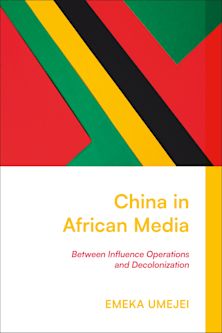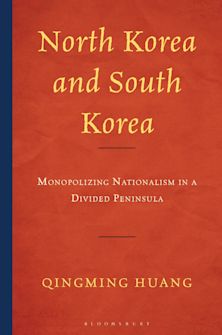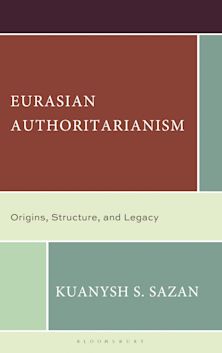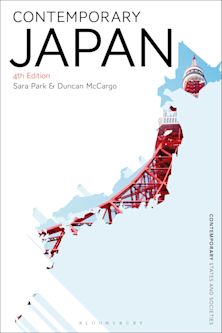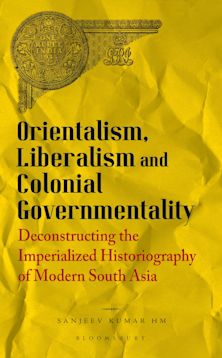- Home
- ACADEMIC
- Asia Studies
- Asian Politics, Government and International Relations
- Germany and China
Germany and China
How Entanglement Undermines Freedom, Prosperity and Security
Germany and China
How Entanglement Undermines Freedom, Prosperity and Security
You must sign in to add this item to your wishlist. Please sign in or create an account
Description
As Europe finds itself once again caught between two superpowers – the USA and a rising China – little has been written about a relationship that will have a profound influence on the international order: the relationship between the People's Republic of China and Germany.
In Germany and China, leading international relations expert Andreas Fulda looks critically at the increasingly interdependent relationship between the two countries. Drawing on examples from politics, industry, development aid and technology sectors and academia, the book explores how successive governments from Helmut Kohl to Angela Merkel have pursued ever-closer ties to China in the interests of short term economic gain. Fulda explores the danger of this increasing entanglement not just for Germany, but for Europe and the international world order.
Table of Contents
PART 1 | Germany's Entanglement with Autocratic China: Causes, Culprits and Consequences
Chapter 1. Germany's Rude Awakening
Chapter 2. Strategic Culture, the Steinmeier Doctrine and the Puzzle of German Power
Chapter 3. Why the CCP Struggles Against its Oopponents, at Home and Abroad
Chapter 4. How Kohl, Schröder, Merkel and Scholz Normalised Autocratic China
Chapter 5. Challenges to Germany's China Policy at the Dawn of the Merkel Era (2018-21)
PART 2 | Policy Failures and Competing Policy Images: Germany's Protracted Paradigm Shift
Chapter 6. The Demise of Germany's Solar Industry and Volkswagen's China Conundrum
Chapter 7. Germany's Lost Crown Jewel Kuka Roboter GmbH and Berlin's Huawei Dilemma
Chapter 8. Squandered German Leverage and Limits to Dialogue and Cooperation with China
Chapter 9. Europe's Arms Embargo, Dual Use Exports and Germany's Indifference Towards Taiwan
Chapter 10. Censorship, Self-Censorship and Compromises in Academic Cooperation with China
Chapter 11. Towards Greater Autocracy Competence in Germany?
Bibliography
Index
Product details

| Published | 30 May 2024 |
|---|---|
| Format | Ebook (PDF) |
| Edition | 1st |
| Extent | 256 |
| ISBN | 9781350357044 |
| Imprint | Bloomsbury Academic |
| Publisher | Bloomsbury Publishing |
About the contributors
Reviews
-
China matters to Germany, Europe and the world. Getting our policy towards a resurgent China right is important to Germany, Europe and other democracies. Andreas Fulda has raised serious questions about the German establishment's engagement with China in this book. It should be required reading for policy makers and others interested in how we should engage China.
Steve Tsang, Director of the SOAS China Institute
-
Andreas Fulda masterfully dissects a series of Germany's pathological self-deceptions which hamper effective foreign policy, trade, and security. Exercising an impressive degree of self-reflection and impartiality, Fulda shows how a moralized, dysfunctional style of debate helped sustain obsolete policy images. The book thus offers the rare feat of not only a meticulously researched problem analysis, but also an applied example of how a robust implementation of transparency in political debates may be implemented.
Pascal Jürgens, Trier University, Germany
-
Germany and China: How Entanglement Undermines Freedom, Prosperity and Security is a tour de force. Grounded in 25 years of research and on-the-ground experience, Andreas Fulda's third book provides an ominous critique of Germany's economic and psychological dependence on China, and the subsequent threat posed to Germany's national security. Fulda contextualises his epic account in a rich socio-political history of Germany and China relations, offering both a philosophical and pragmatic critique.
Jane Richards, University of Leeds, UK
-
In this highly readable monograph, Andreas Fulda scrutinises, and debunks, some of the most consequential flaws in German academic and policy thinking about the People's Republic. Xi Jinping's unmistakably clear intent to make China the next superpower requires no less than a strategic view on this country, underpinned by serious China expertise. Fulda's account, thus, betrays the power-related frictions that conventional German approaches will need to undergo. The author's research achieves this ambitious goal rather superbly.
Maximilian Terhalle London School of Economics, UK
-
This book carries important lessons for democracies in general. It shows the risks of developing deep economic interdependencies with autocratic regimes – how they may lead to highly destructive material and psychological dependencies, opening-up for malign foreign influence. As such, Fulda's new book provides a critical contribution and a must read for European policymakers and business managers at large now struggling with 'de-risking' their China relations and developing greater autocracy competence in the wake of Russia's war of aggression in Ukraine.
Mikael Wigell, Finnish Institute of International Affairs
-
Fulda discusses the ideas and policy decisions that led to the current level of dependency and vulnerability. It is required reading for anybody who wants to know how we got there, how politicians, scientists, diplomats and lobbyists created the German ideology of 'rapprochement through interweaving'. Fulda also offers a way out of the policy of voluntary entanglement. His book is a landmark on the way to a new strategic culture vis-à-vis China.
Jörg Lau, Foreign Affairs Editor at DIE ZEIT

ONLINE RESOURCES
Bloomsbury Collections
This book is available on Bloomsbury Collections where your library has access.












